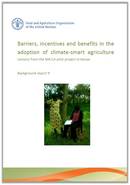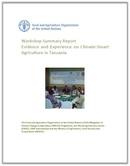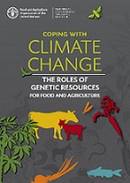Следующие ресурсы, связанные с КОСХ, призваны оказывать помощь заинтересованным сторонам и исследователям на глобальном, региональном и местном уровнях в их работе по реализации практик КОСХ.
Publications
Over 50 climate change and agriculture experts from research institutions, government, development partners, farming community and NGOs gathered in a national workshop on climate change and agriculture "Sharing Evidence and Experience on Climate-Smart Agriculture" in Dar es Salaam 15 and 16 October, 2014. The workshop was organized jointly by the Food and Agriculture Organization of the United Nations (FAO), the World Agroforestry Center (ICRAF), CARE International and the Ministry of Agriculture, Food Security and Cooperatives (MAFSC). This document reflects the presentations discussions and conclusions of the workshop supported by evidence and experience from CSA projects in Tanzania.
The publication reports on the concepts driving the scientific activities of the MICCA’s pilot projects in East Africa. It describes the analytical approaches used, provides an outline of the research results and concludes with key messages relevant to discussions on climate-Smart Agriculture. In partnership with the World Agroforestry Centre (ICRAF), the East Africa Dairy Development Project (EADD) and Care International, these MICCA pilot projects mainstream climate-Smart Agriculture in the regions by identifying, verifying and scaling up farm management practices that can both increase productivity and ensure smallholder farmers are part of the solution to climate change.
The objective of this study is to enhance understanding of El Niño using FAO’s Agricultural Stress Index System (ASIS). Agriculture is one of the main sectors of the economy that could be severely affected by El Niño which can increase the prevalence of food insecurity and malnutrition.
Better understanding of the El Niño Phenomenon can improve the early warning capabilities of FAO and partners to trigger timely disaster risk reduction measures.
This publication summarizes the results of thematic studies that were prepared by FAO at the request of the Commission on Genetic Resources for Food and Agriculture. The studies look at the interactions between climate change and plant, animal, forest, aquatic, invertebrate and micro-organism genetic resources. Climate change poses new challenges to the management of the world’s genetic resources for food and agriculture. Genetic resources play a crucial role in food security, nutrition and livelihoods and in the provision of environmental services.





